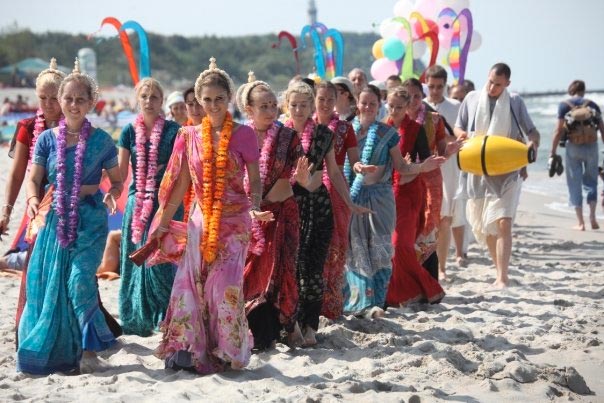Festival of India Poland Celebrates 20 Years on the Beach
By Gaura Hari Dasa | Sep 12, 2009

Parvati Dasi, who just turned twelve years old, gives a warm and genuine smile as she hands an old lady an invitation to Festival of India in the town of Rewal, Poland. On the beach beside her, sixty devotees carrying flags, umbrellas and festoons sing the Hare Krishna mantra with the waves of the Baltic sea rippling around their feet.
The Festival of India celebrated its 20th anniversary in Poland this summer. As the communist era came to an end almost a decade before Parvati was born, ISKCON devotees started presenting Krishna conscious culture to the people of Poland in the form of a festival. The idea was to present all aspects of devotional life and allow the public to not only learn about, but actually experience spiritual culture.
Like most things, it started small. Devotees began by advertising on the streets and in schools. They would sing Hare Krishna and pass out invitations for the festival that night. Sometimes they would stop the singing and put on a spontaneous drama or dance for the crowd that had gathered around. Then the festival, consisting of dance, music, drama, free vegetarian prasadam, and a short talk on Krishna conscious philosophy, would take place in a local hall. After many years of being cut off from foreign cultures and ideas by the communist regime, people were now open and eager to learn about something different.
As the years went by, the festival moved outdoors. Now there were tents and a main stage which was packed full with entertainment. Each year there were new tents, and the festival got bigger and bigger. The truck which housed the stage was replaced by a professional outdoor events stage. And the festival had far more to offer—astrology, cooking classes, restaurant, yoga classes, questions and answers, book stalls, face painting and henna are just a few of the attractions at today’s festival.
The five-hour stage program includes all the basic elements of the stage show from twenty years ago, but much more besides. As well as dramas there are now shows for children depicting Krishna’s pastimes with enormous puppets. Dance is presented in many different styles and forms with elaborate and colorful costumes all centered around the rich Vedic culture of India. Talented musicians and martial artists leave their audiences thrilled and enlivened. There is something for all the family, including a talk on the Bhagavad-gita for those who want to understand the deeper meaning behind the festive experience. The talk is usually followed by people lining up at the book stall to purchase the sacred text, translated into Polish by the Bhaktivedanta Book Trust. The festival ends each night with a joyous kirtan chant during which all the children are encouraged to dance; the five most enthusiastic dancers win a sari or a flower garland.
For three months of the summer the Festival travels along the Baltic sea coast of Poland performing for three nights in each town. A crew of over two hundred devotees work tirelessly, putting on six festivals a week.
Of course, to house such a huge team is not easy, and so a large public school is hired for the summer months. The gymnasium becomes the temple room and the classrooms become large communal bedrooms or ashrams. Families with children stay close by in rented rooms in the local village. Each member of the team is a volunteer, and despite there being so many devotees, living and working closely together is akin to being part of a big family, and brings out a wholesome mood.
Indradyumna Swami, who started the program twenty years ago, still remains a driving force behind the whole operation. Assisted by a team of managers and department heads, he runs the whole show like clockwork. "So many things have changed over the years. We have had many ups and downs," the Swami explains. "But we have something wonderful to offer people, and they appreciate it so much. Hopefully that will never change, and this tour can go on for many, many more years."
The kirtan party weaves its way along the beach as Parvati Dasi continues to pass out invitations to the festival. Each hand that takes an invitation is accompanied by a smile. Her happiness is contagious it seems, as is that of all the devotees who are singing close by.
For the people of these towns along the coast the festival has already been part of their lives for so many years. Some, who live in other parts of the country, even plan their holidays around which town the festival will be in. Teenagers have grown up with the festival and even know some of the devotees by name, despite only seeing them a couple of days out of each year. For them and for young devotees like Parvati, the tour is part of their life past and present, and all the signs indicate that it will continue to be so far into the future.














